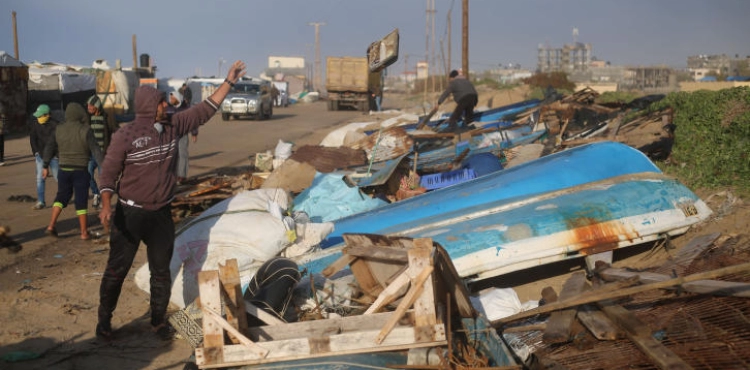The Agricultural Development Association (Agricultural Relief) and the fishermen´s committees monitored a number of losses suffered by fishermen as a result of the recent depression, which inflicted great damage on the rooms and properties of fishermen in various governorates of the Gaza Strip during the three days of depression , Warning that these losses will be doubled if the decline continues.
In Beit Lahia, in the northern Gaza Strip, the roofs of fishermen’s rooms were blown off, some rooms were demolished, and the waves pulled the fishermen’s nets. In Gaza, a group of “hookahs” sank inside the port basin and damaged the roofs of fishermen’s rooms south of the port in the Sheikh Ajlin area.
In the central region, the roofs of the rooms were blown out, the waves pulled some fishing gear, and in Khan Yunis the fishermen’s rooms were flown out from the port, and the waves pulled some of their equipment. In Rafah, the waves pulled some of the “hooks” and paddles, causing them to break, as well as the roofs of the rooms and the waves pulled the fishermen´s equipment.
The fisherman, Muhammad al-Sultan, from Beit Lahiya, said that Agricultural Relief had provided them with rolls of nylon to cover the equipment rooms that protect their equipment from wind and rain, but the storm had torn off all the nylon.
And the Sultan added, "We need solid sheets to protect our rooms that house our equipment and ourselves from rain and wind." The Sultan called on civil and international institutions to supply the rooms with sheets in order to protect them from storms and rain.
In turn, the Director of Agricultural Relief in the Gaza Strip, Eng. Tayseer Muheisen, said that the fishing sector is one of the most fragile and endangered sectors, in addition to being periodically exposed to losses and accumulation of debts as a result of buying nets and equipment for the occupation to confiscate, in addition to determining fishing areas where the occupation began to limit The permissible areas for fishing were reduced to six nautical miles, and later they were reduced to three miles, as well as increasing operational costs related to fuel provision and equipment maintenance.
Agricultural Relief appealed to the relevant international and local institutions to lend a helping hand to the fishermen in the sector, especially as they incur heavy losses as they are considered among the poor groups within society, especially as they are waiting for the beginning of the calendar year to come to the large "nucleus", which is called the "birth nucleus," to bring them fish. Frequently, but this year it was delayed for two weeks and several days.
Fishermen are preparing for the nouveau by installing their boats and repairing their equipment rooms, but the wind is greater than their preparations, causing the nylon to be torn apart and the tinplate "zinco" flying off their rooms.












